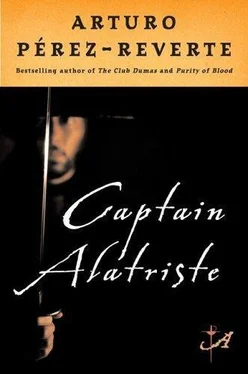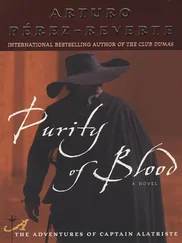Arturo Perez-Reverte - Captain Alatriste
Здесь есть возможность читать онлайн «Arturo Perez-Reverte - Captain Alatriste» весь текст электронной книги совершенно бесплатно (целиком полную версию без сокращений). В некоторых случаях можно слушать аудио, скачать через торрент в формате fb2 и присутствует краткое содержание. Жанр: Старинная литература, на английском языке. Описание произведения, (предисловие) а так же отзывы посетителей доступны на портале библиотеки ЛибКат.
- Название:Captain Alatriste
- Автор:
- Жанр:
- Год:неизвестен
- ISBN:нет данных
- Рейтинг книги:3 / 5. Голосов: 1
-
Избранное:Добавить в избранное
- Отзывы:
-
Ваша оценка:
- 60
- 1
- 2
- 3
- 4
- 5
Captain Alatriste: краткое содержание, описание и аннотация
Предлагаем к чтению аннотацию, описание, краткое содержание или предисловие (зависит от того, что написал сам автор книги «Captain Alatriste»). Если вы не нашли необходимую информацию о книге — напишите в комментариях, мы постараемся отыскать её.
Captain Alatriste — читать онлайн бесплатно полную книгу (весь текст) целиком
Ниже представлен текст книги, разбитый по страницам. Система сохранения места последней прочитанной страницы, позволяет с удобством читать онлайн бесплатно книгу «Captain Alatriste», без необходимости каждый раз заново искать на чём Вы остановились. Поставьте закладку, и сможете в любой момент перейти на страницу, на которой закончили чтение.
Интервал:
Закладка:
What happened next is history. Witnesses report that, in the box where the supposedly incognito king, Wales, Buckingham, and their train of courtiers were sitting, everyone was watching the altercation below with great interest, though with conflicting emotions. Our monarch, as was natural, was annoyed by the shameful affront to public order in his august presence, even though that presence was not official. But the young, daring, and chivalrous part of his being was not, in a deeper sense, greatly disturbed that his foreign guests were witnessing a spontaneous demonstration of courage on the part of his subjects, men whom, after all, they usually met on the field of battle.
One thing could not be disputed, and that was that the man fighting against five was doing so with unbelievable desperation and courage, and that after only a few slashes and thrusts he had drawn the sympathy of the audience and shouts of anguish among the ladies when they saw him so sorely pressed.
Our lord and king was torn, it was later reported, between protocol and enjoyment, and therefore was slow to order the head of his civilian-clad escort to intervene and put an end to the disturbance. And just as finally he opened his mouth to give a royal, uncontestable order, to everyone's surprise and admiration, Don Francisco de Quevedo, who was very well known at court, jumped resolutely into the fray.
But the greatest surprise was still to come. The poet had shouted the name Alatriste as he entered the tournament, and our lord and king, aghast at every new development, noticed that when Buckingham and Charles of England heard that name, they turned to look at each other with a start of recognition.
"Ala-tru-iste!" exclaimed the Prince of Wales, with his childish British pronunciation. And after leaning over the railing an instant, he quickly assessed the situation in the yard below, again turned to Buckingham, and then the king. In the days he had spent in Madrid he had had time to learn a few words and phrases of Spanish, and using them, he apologized and excused himself to the king.
"Diess-culpad, Si-yure. ... I am indebted to that man. He saved my life."
Even as he spoke, as phlegmatic and serene as if he were at Saint James's Palace, he removed his hat, adjusted his gloves, and asking for his sword looked at Buckingham with perfect sangfroid.
"Steenie," he said.
Then, without hesitation, steel in hand, he raced down the stairs, followed by Buckingham, who was pulling out his sword. An astonished Philip did not know whether to stop them or go to the railing to watch, so that by the time he recovered the composure he had been so close to losing, the two Englishmen were already in the yard of the corral de comedias, crossing swords with the five men who had Francisco de Quevedo and Diego Alatriste boxed in.
It was a combat of which epics are made. Boxes, galleries, cazuela, benches, and yard—all stupefied to see Charles and Buckingham appear with weapons in hand—exploded with a roar of applause and shouts of approval. With that, our lord and king reacted, rose to his feet, turned to his courtiers, and ordered them to end the madness. As he gave the order, his glove dropped to the floor. And that, in someone who ruled forty-four years without ever raising an eyebrow or changing expression in public, betrayed how that afternoon in El Principe corral, the monarch of both the new world and the old came within an ace of revealing
emotion.
XI THE SEAL AND THE LETTER
Through a window that opened onto one of the large courtyards of the Alcazar Real, the crisp shouts of the Spanish, Burgundian, and German troops reached Diego Alatriste's ears as the guard was changed at the palace gates. There was a single carpet on the wood floor of the room, and on it an enormous dark table covered with papers, files, and books, as somber as the man seated behind it. This man was methodically reading letters and dispatches, one after another, and from time to time he wrote something in a margin with a quill he dipped into a Talavera pottery inkwell. He worked without stopping, as if ideas were flowing across the paper as smoothly as his reading, or the ink. This went on for a long while.
The man did not look up even when the head constable, Martin Saldana, accompanied by the sergeant and two soldiers of the royal guard who had brought Diego Alatriste through secret corridors, led him in and then withdrew. The man at the table continued dispatching letters, unperturbed, as if he were alone, so the captain had all the time in the world to study him. He was corpulent, with a large head and a ruddy face; coarse black hair fell over his ears, and his chin and cheeks were covered by a thick dark beard and enormous mustache. He was clad in dark blue silk trimmed with black braid, and his shoes and hose were black as well. On his chest blazed the red cross of Calatrava, which along with the white ruff and a handsome gold chain was the only contrast to his somber attire.
Although Gaspar de Guzman, third Conde de Olivares, would not be made a duke until two years later, he was enjoying his second year of favor at court. At age thirty-five, he was a grandee of Spain, and his power was enormous. The young monarch, much fonder of fiestas and hunting than of affairs of government, was a blind instrument in Guzman's hands, and any who might have overshadowed him were either crushed or dead. His former protectors, the Duque de Uceda and Fray Luis de Aliaga, favorites of the previous king, found themselves in exile; the Duque de Osuna was in disgrace, with his properties confiscated; the Duque de Lerma had escaped the gibbet thanks to his cardinal's robes— He whose cape is cardinal red will not hang by the neck until he's dead, was the old saying—and
Rodrigo Calderon, another of the principals in the former regime, had been executed in the public plaza. Now no one stood in the way of that intelligent, cultured, patriotic, and ambitious man's design to hold in his hands the strings of the empire that was still the most powerful on earth.
It is easy enough to imagine the emotions Diego Alatriste was experiencing as he stood before this all-powerful favorite of the king in that huge chamber in which, except for the table and carpet, the only decoration, mounted above a large unlighted fireplace, was a portrait of Philip the Second, grandfather of the present monarch. The captain's apprehension grew after he recognized in the man at the table—without the least doubt or pause to consider—the taller and stronger of the two masked men from that first night at the Santa Barbara gate. The same man whom the one with the round head had called Excellency before his superior left, after requesting that not too much blood be shed in the affair of the two Englishmen.
If only, the captain thought, the execution that lay in store for him would not be by garrote. It was not that dangling at the end of a rope was his cup of tea, either, but at least it was better than being removed with an ignominious tourniquet squeezing tighter and tighter around his neck, his face contorted as he heard the executioner say, "Forgive me, Your Mercy, I am only following orders."
May Christ unleash a thunderbolt to incinerate all the spineless lackeys who were "just following orders," and take with them the bastards who gave the orders as well. Not to mention the obligatory handcuffs, brazier, judge, reporter, scribe, and executioner needed to obtain a proper confession before speeding your disjointed body toward Hell. Diego Alatriste did not sing well with a rope around his neck, so his last serenade would be long and painful. Given a choice, he would have preferred to end his days with steel, fighting. That was, after all, the decent way for a soldier to make his exit: Viva Espana! and all that, and little angels singing his way in Heaven, or wherever he was to go.
Читать дальшеИнтервал:
Закладка:
Похожие книги на «Captain Alatriste»
Представляем Вашему вниманию похожие книги на «Captain Alatriste» списком для выбора. Мы отобрали схожую по названию и смыслу литературу в надежде предоставить читателям больше вариантов отыскать новые, интересные, ещё непрочитанные произведения.
Обсуждение, отзывы о книге «Captain Alatriste» и просто собственные мнения читателей. Оставьте ваши комментарии, напишите, что Вы думаете о произведении, его смысле или главных героях. Укажите что конкретно понравилось, а что нет, и почему Вы так считаете.










